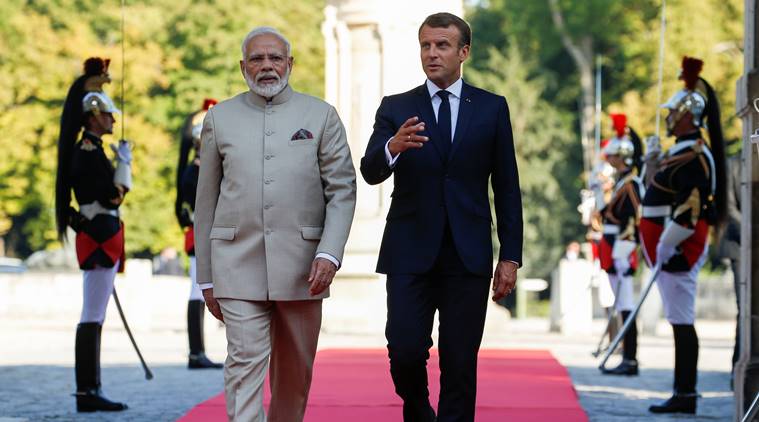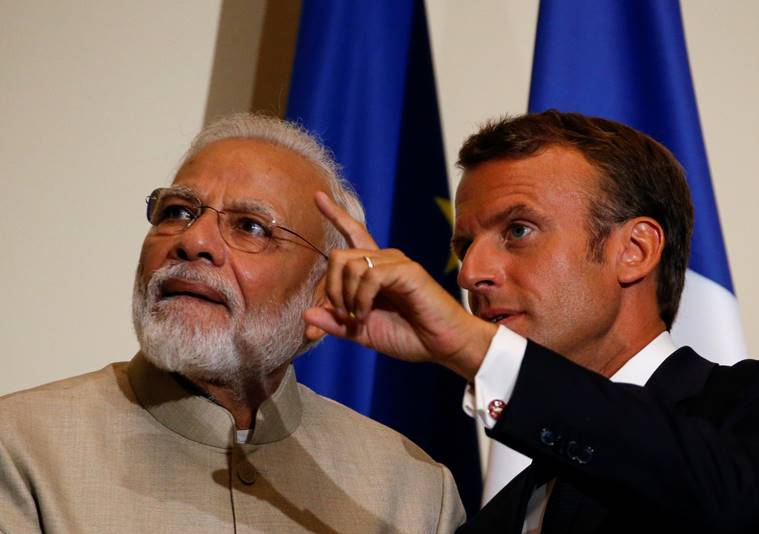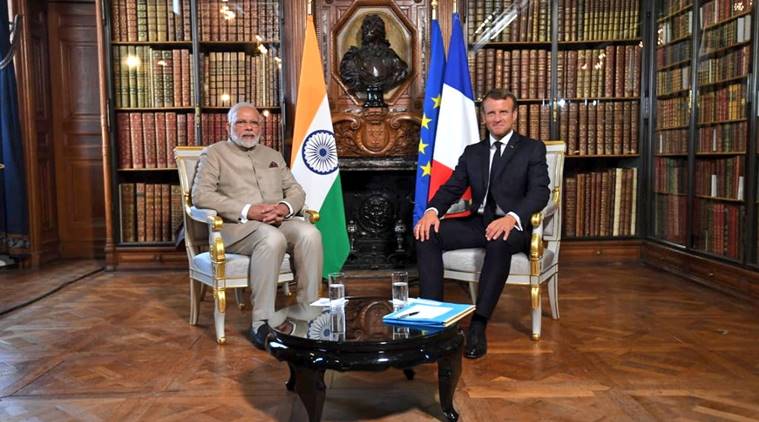Macron said that he had discussed Kashmir with Modi, and called for stability while stressing that no one should incite violence over this issue. He also called for the rights of people to be maintained. Prime Minister Modi, however, did not refer to Kashmir in his statement to the media.
Echoing the Indian line on Jammu and Kashmir, French President Emmanuel Macron Thursday said that India and Pakistan should resolve the issue bilaterally, and that no outside interference was needed.
At a joint press conference with Prime Minister Narendra Modi, who reached France Thursday, Macron said that he would also convey to Pakistan Prime Minister Imran Khan that the issue should be resolved bilaterally.
Macron said that he had discussed Kashmir with Modi, and called for stability while stressing that no one should incite violence over this issue. He also called for the rights of people to be maintained. Prime Minister Modi, however, did not refer to Kashmir in his statement to the media.
In a separate joint statement, issued days after France backed India at the UN Security Council’s closed-door consultations on J&K in New York, Macron endorsed Modi’s call for a global conference on terrorism.
Modi, who was received by French Foreign Minister Jean-Yves Le Drian, met Macron at the Château de Chantilly in the Hauts-de-France region of Oise, 60 km from the capital. Modi had first proposed a conference on terrorism during his visit to the Maldives three months ago.
Macron’s endorsement was one of the major takeaways from a joint statement by the two sides that outlined a number of bilateral measures, including forward movement on delivery of the first Rafale combat aircraft from this year.
France also supported India’s view of holding timely Presidential elections in Afghanistan, putting an end to terrorist safe havens and preservation of human rights, including women’s rights.
The joint statement also included a “roadmap on cybersecurity and digital technology”, techno-commercial offers for constructing six nuclear power reactors in Jaitapur, and a space surveillance for “joint maritime domain awareness mission” in the Indo-Pacific. France will also train medical support personnel for astronauts who will be part of India’s manned space mission by 2022.
The two sides also decided to address each other’s concerns on trade and investment through “new ways and mechanisms”, and decided to reactivate the high-level France-India economic and financial dialogue as quickly as possible, the statement said.
It said that the student exchange target of 10,000 set in 2018 will be fulfilled this year and that both sides have decided to enhance the number to 20,000 by 2025.
The joint statement said that their traditional relationship is “enduring, trustworthy, like-minded, and all-encompassing”, and marked by mutual trust between two strategic partners who have “always stood by each other”. India and France became strategic partners in 1998, and France was the only country from the West that did not impose sanctions after Pokhran-II.
Modi and Macron also discussed the delivery of the first Rafale aircraft, expected in the third week of September.
Stressing that defence industrial cooperation is one of the “mainstays” of the partnership, they “noted with satisfaction the progress made in the implementation of agreements signed, particularly the delivery of the first Rafale combat aircraft from this year”.
This marks a step forward from the inter-governmental agreement for the purchase of 36 Rafale jets by India in flyaway condition that was signed in New Delhi in September 2016.
Making common ground on terrorism, the two leaders strongly condemned terrorism in all forms, including “cross-border terrorism” and terror-related incidents in France and India.
As both sides continue to cooperate on the Financial Action Task Force (FATF) to greylist Pakistan and move towards blacklisting, the two leaders reaffirmed their resolve to eliminate terrorism and urged the international community to strengthen efforts to tackle terrorist-financing.
In a new initiative, they called upon all UN member countries to implement the UNSC Resolution 2462 on Fighting Terrorist Financing, which was adopted last March. They welcomed the new “No Money for Terror” International Conference on Fighting Terrorist Financing to be held in Melbourne on November 7-8.
“Both the leaders agreed to work for early convening of the Global Conference, proposed by India, to tackle the threat of terrorism around the world,” the joint communique said.
It said that in the digital space, the two countries support economic and social development through an open, secure and peaceful cyberspace, in which international law applies. “…the two leaders have adopted a cybersecurity and digital technology road map aimed at expanding Indo-French bilateral cooperation, particularly in the strategic sectors of high performance computing and Artificial Intelligence, with the target of bringing our start-up ecosystems closer to each other,” it said.
They welcomed the signing of the agreement between the Centre for Development of Advanced Computing and Atos aimed at developing cooperation in quantum computing, Artificial Intelligence and exascale supercomputing.
On the nuclear front, the statement said that two leaders expressed satisfaction at progress in negotiations between NPCIL and France’s EDF for the construction of six nuclear power reactors in in Jaitapur, Maharashtra.
“They also noted that discussions are underway on the Techno Commercial Offer and the financing of the project as well as on how to increase localization through manufacturing in India and enhance common understanding on the Civil Nuclear Liability Act between the two sides,” it said.
On trade, the two sides jointly agreed that the high-level France-India economic and financial dialogue should be reactivated as quickly as possible, the statement said.
On space cooperation, it said: “France and India thus welcome the decision to train medical support personnel for Indian astronauts, who will be part of India’s manned space mission by 2022. The training will be carried out in France and in India.”
The joint communique pushed for full compliance with the Joint Comprehensive Plan of Action (JCPOA) on the Iranian Nuclear Programme, and said that current issues need to be resolved peacefully through dialogue.
Source: Read Full Article





